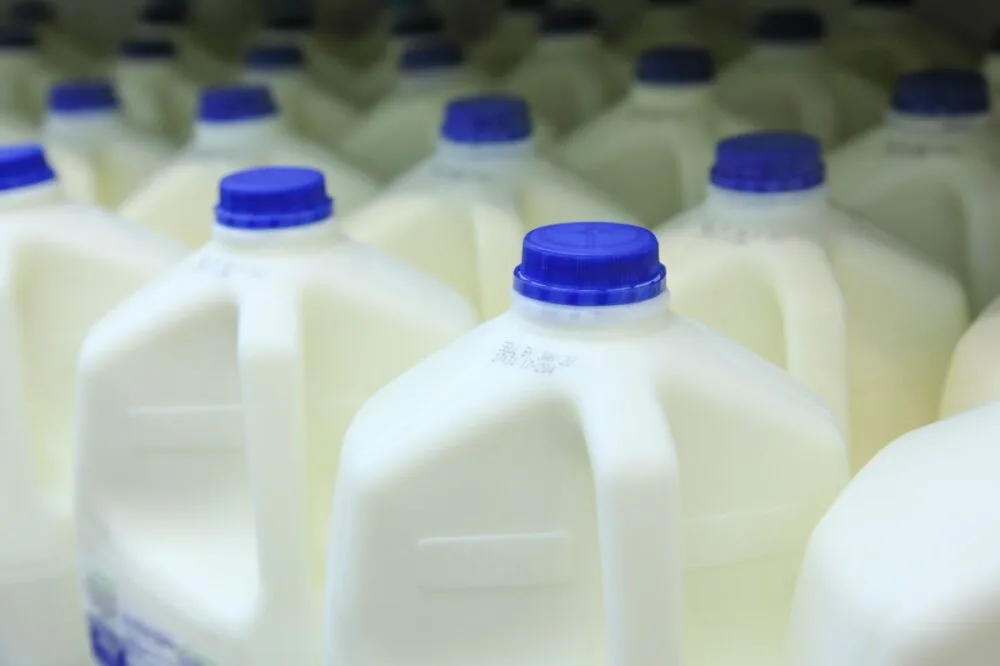How Much Does a Liter of Milk Weigh

A liter of milk weighs 1,000 grams.
WEIGHING SCALE LITER KG FOR MILK DAIRY
A liter of milk weighs about 1,000 grams. That’s a little over 2 pounds. A gallon of milk, which is 8 times as much milk, weighs about 8 pounds.
How Much Does a Litre of Water Weigh
A litre of water weighs 1,000 grams or 1 kilogram. This is because 1 litre is equal to 1,000 millilitres and each millilitre of water weighs 1 gram.
How Much Does Milk Weigh in Kg
A gallon of milk weighs 8.6 kg, so a quart of milk would weigh 2.15 kg. A pint of milk would weigh 1.08 kg and a cup of milk would weigh 0.27 kg.
How Much Does a Carton of Milk Weigh in Kg
A gallon of milk weighs about 8.6 pounds, which is close to 4 kilograms. So a carton of milk would be half that, or close to 2 kilograms.
How Much Does a Litre of Milk Cost
A litre of milk costs approximately $1.50. This price may differ depending on the location, type of milk, and brand. For example, organic or grass-fed milk may cost more than regular milk.
Milk is an essential part of many people’s diets and is a good source of protein, calcium, and other nutrients. Despite its health benefits, some people choose not to drink milk for various reasons, such as lactose intolerance or ethical concerns about the dairy industry.
How Much Does 2 Litres of Milk Weigh
If you’re wondering how much 2 litres of milk weighs, the answer is 4.409 pounds (2 kilograms). This weight is for whole milk, but other types of milk will have different weights. For example, skim milk weighs about 3.5 pounds (1.6 kilograms).
To put this into perspective, a gallon of milk weighs 8.6 pounds (3.9 kilograms). So, 2 litres of milk is half the weight of a gallon of milk.
1 Liter of Milk to Cups
A liter of milk is about 4 cups. So 1 liter of milk is equal to 4 cups.
5 Liter Milk to Kg
One litre of milk is approximately 1.03 kilograms. So 5 litres of milk is just over 5 kilograms.
Weight of 1 Litre Oil
Oil is a common ingredient in many products that we use every day. It can be used for cooking, lubricating, and even cleaning. Despite its ubiquity, oil is a surprisingly heavy substance.
One litre of oil weighs approximately 920 grams. This is almost double the weight of water, which has a density of 1 gram per millilitre.
The high density of oil is due to its composition.
Oil is mostly made up of hydrocarbons, molecules that contain both hydrogen and carbon atoms. These molecules are very large and have a lot of mass. That’s why oil is so dense – and also why it’s such an important source of energy.
When you’re buying oil, you may notice that different types have different densities. For example, olive oil has a density of 0.91 grams per millilitre while canola oil has a density of 0.88 grams per millilitre. The denser the oil, the more calories it contains per unit volume.
So if you’re looking to cut down on calories, choose an oil with a lower density.

Credit: www.foodcheats.com
What Does 1Litre Milk Weigh?
A litre of milk typically weighs between 1.03 and 1.33 kg, although there can be some variance depending on the fat content of the milk and whether it is whole, skimmed or semi-skimmed. The weight of a litre of milk is therefore slightly more than 1kg.
How Many Pounds is a Litre of Milk?
A litre of milk is approximately 2.2 pounds, but it can vary depending on the type of milk and how full the container is.
Is 1 Kg Milk is Equal to 1 Liter?
There is a lot of confusion when it comes to milk and measurement, especially when converting between metric and imperial units. So, is 1 kg milk equal to 1 liter? The answer is no, 1 kg is not equal to 1 liter.
One kilogram of milk is actually equivalent to just over one litre – 1.03 litres, to be precise. This means that slightly more than 10% extra milk would be required to fill a one litre container if using kilograms as the unit of measurement, rather than litres. So why the difference?
It all has to do with density.
One litre of milk weighs around 860 grams – this figure can vary depending on the fat content of the milk (full-fat milk is heavier than skimmed milk, for example). Water has a density of 1000kg/m3 at 4°C, whereas whole milk has a density of around 1030kg/m3.
This means that although one litre of water and one litre of milk both occupy the same amount of space (one cubic metre), the weight of the two substances differs due to their different densities; there are more particles packed into a given space in Milk than in water. Thus, one kilogram of water occupies less volume than one kilogram orMilk. In fact, 1kgof water occupies just over 0.9litres while1kgofmilkoccupies1litreand1kilogramofgoldoccupies only 0.0064litres!
Does 1 Litre of Water Weigh the Same As 1 Litre of Milk?
No, 1 litre of water does not weigh the same as 1 litre of milk. The reason for this is because milk is denser than water. This means that there are more particles in a given space in milk than there are in water.
Consequently, 1 litre of milk weighs more than 1 litre of water.
Conclusion
A liter of milk weighs about a kilogram. This is because milk is about 87% water and the rest is made up of fat, protein, lactose, and minerals.





